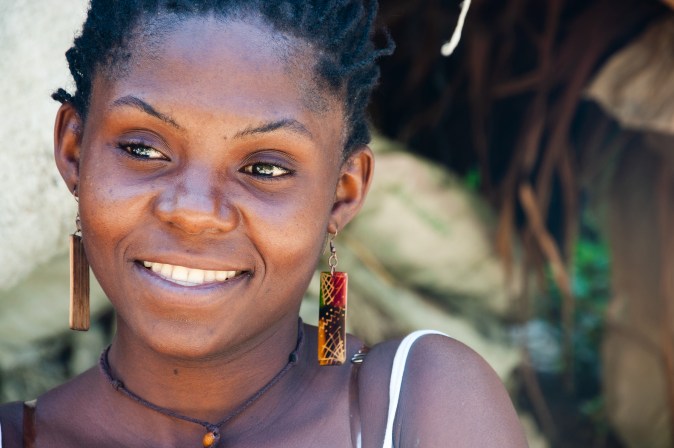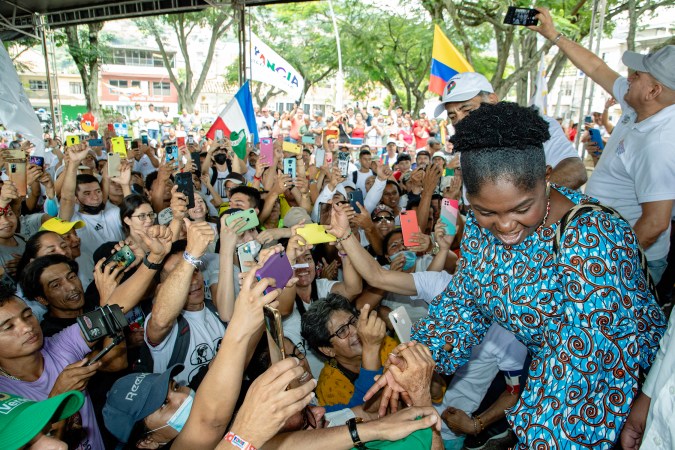Supporters assembled by the thousands at her rallies. Large, colorful posters of her face hung prominently in highrise windows and covered sides of buildings and stretches of city walls. Media commentators described her in the news as a political “phenomenon.”
In Colombia’s 2022 presidential elections, Francia Márquez, a small-town activist, captivated the country when she became the first Afro-Colombian woman to be elected vice president. Her victory in a country historically governed by a white, male elite defied all political odds and set a new precedent for Black political leaders.
Now, nearly two years after her electoral triumph, Colombian filmmaker Juan Mejía Botero has released a new documentary recounting Márquez’s inspiring story, charting her beginnings as a young activist in the remote mining town of La Toma and following her arduous and awe-inspiring ascent to one of the highest political offices in the country.
Igualada is an emotional journey that opens with the young, teary-eyed faces of Black women looking up in admiration at Márquez at a rally in Colombia’s capital. For many voters in the crowd, it’s the first time they’ve ever felt represented by a candidate.


Márquez is a witty and charismatic leader, but above all else, she comes across as earnest and resolute in her commitment to advocate for the so-called “nobodies.” The documentary best illustrates her resolve in the archival footage that Mejía recorded from 2009 to 2011 as Márquez’s hometown of La Toma set off a campaign against mining.
In such clips, a younger Márquez opens up about her relationship to the land, explaining that she enjoys most listening to the sounds of the river, and addressing the death threats that her and her community face in their fight to protect the environment.
“Seeing a woman as young as Márquez willing to risk it all for the sake of her territory and her community blew me away,” said Mejía in an interview with Remezcla.

The time that Mejía spends in La Toma forges a friendship with Márquez. More than a decade later, she calls the filmmaker to announce her plans to run for president, compelling Mejía to resume recording and to follow her candidacy wherever it leads. Márquez later loses the primary race, but joins frontrunner Gustavo Petro as his running mate and wins. The trajectory of Márquez’s campaign was always uncertain, Mejía says, but from the start, he was convinced it was a story he wanted to tell.
“I had no way of knowing anything that was going to happen,” said Mejía. “I only knew Francia. And after many years, I knew that her conviction was sincere.”
Throughout the film, Márquez’s followers are similarly enthralled by the candidate, who often speaks up against injustices. Throughout the film, she rails against racism in her speeches and brings up class and racial differences when comparing herself to her competitors, who are mostly white, male, and from wealthy backgrounds.


Her defiant disposition often makes her a target of racist and sexist attacks. The title of the film, Igualada, which is a derogatory term that describes a woman who acts above her place in society, alludes to the way Márquez is perceived — as undeserving of the political power she has attained over the years. But Márquez repurposes the term to describe a class of women who rebuke the establishment and who demand more rights.
In all, Igualada may seem like a portrait of another political underdog who prevails, but Mejía argues that the film is more than that. “It was very important for us to portray [the story] as more of a collective struggle. We wanted people to understand that this is a struggle that predates Francia. It isn’t just about Francia. It’s a social movement.”
Márquez, herself, endorses this take. Her political movement “I Am Because We Are” refers to a South African philosophy and advocates a new approach to politics that elevates collectivism above individualism and builds power from the ground up.
In Colombia, droves of apathetic voters responded positively to her movement’s message: more than 11 million Colombians cast a ballot for Petro and Márquez. But Mejía hopes that his film will also resonate with audiences in the United States, especially those who have grown disillusioned with politics, but still desire change.
“Even in a hopeless, alienated, and politically marginalized place like Colombia, people can become hopeful again,” said Mejía. “And if that’s not a message for the United States right now, I don’t know what is.”




